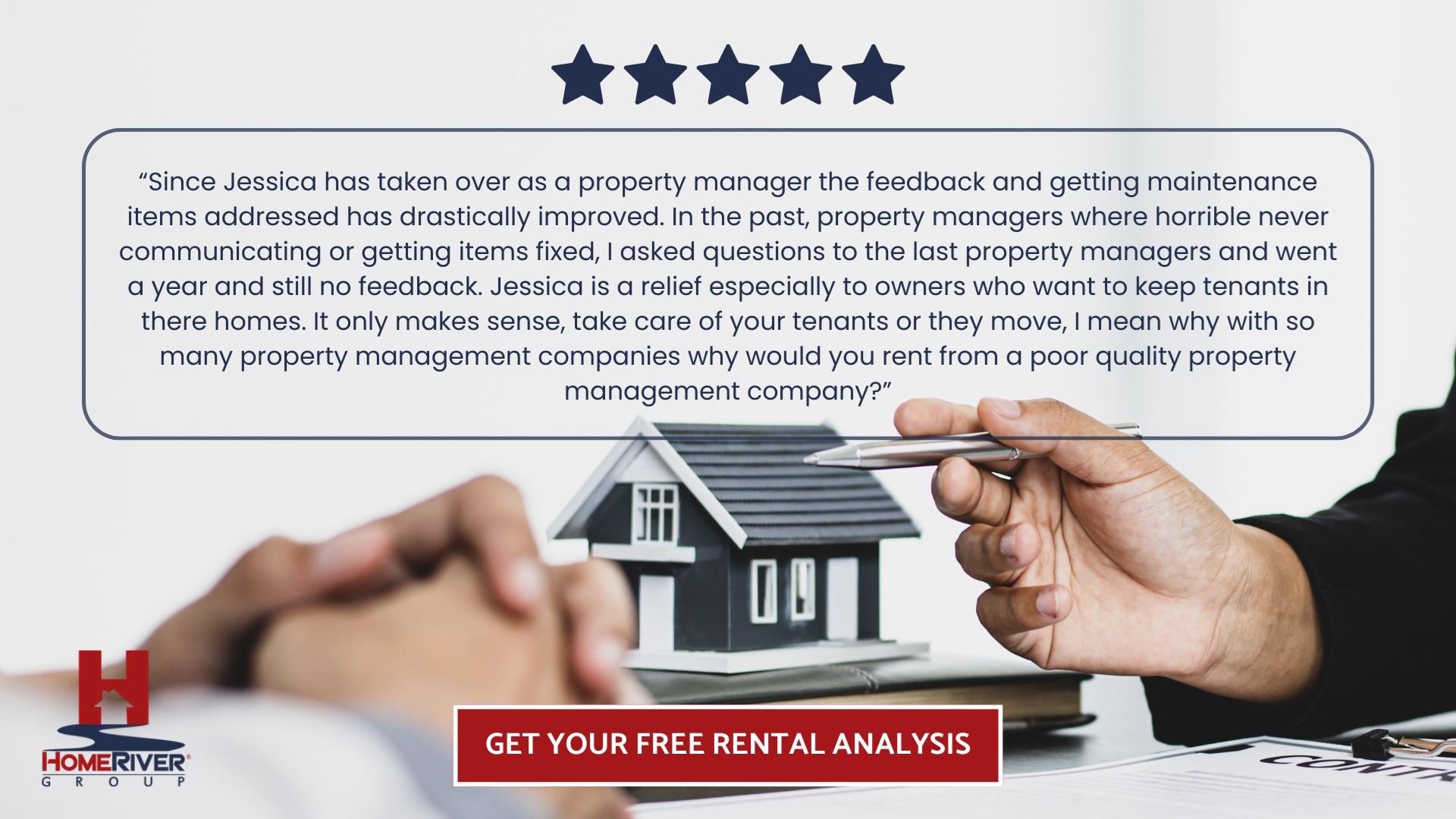
What Happens When Property Management Changes? Tips For A Smooth Transition
At HomeRiver Group, our commitment to providing exceptional service with local expertise puts us at the forefront of ensuring seamless and stress-free transitions. Our unique blend of dedicated local market expertise and a unified national platform allows us to manage these changes effectively, ensuring that your property remains our priority.
Change is inevitable in the real estate market, especially in property management. Whether you're a renter, a buyer, or an investor, understanding what happens when property management changes can help you navigate this transition smoothly.
In this article, we'll guide you through the process of a property management change, highlight what you can expect, and offer tips for a smooth transition that will keep your peace of mind intact.
Preparing For Change: What Tenants Can Expect
When property management transitions to a new company, renters might feel uncertain and curious about how these changes will affect their daily lives and leasing arrangements. Understanding what happens when property management changes can help tenants prepare and adapt to the new management smoothly.
Communication Is Key
The hallmark of a smooth transition is clear and consistent communication from the outgoing property management to the tenants. HomeRiver Group prioritizes keeping tenants informed every step of the way, from initial announcements to reminders about whom to contact for maintenance requests or lease questions. Expect communications via emails, letters, or tenant portals outlining all the changes, including key contacts, payment procedures, and any alterations in policies.
Meet And Greet
It's common for the new property management company to arrange meet-and-greet sessions with tenants. This offers a direct opportunity for tenants to ask questions, express any concerns, and get acquainted with the new faces managing their homes.
Updated Policies And Procedures
With new management comes the potential for updated policies and procedures. This might include changes in payment processes, maintenance request protocols, or amenity usage guidelines. Tenants should carefully review any new documentation provided by HomeRiver Group to understand these changes and comply accordingly.
Lease Agreements
Generally, existing lease agreements are honored up to their expiration date, even after a change in property management. However, tenants must review their lease terms when notified of management changes to confirm this continuity and understand any implications for lease renewals under the new management.
Support And Assistance
Tenants and property managers experience an adjustment period when adapting to new management. HomeRiver Group’s dedicated team of professionals is always available to offer support, address concerns, and ensure that tenants have all the resources they need during this transition period.
The Benefits Of A Fresh Management Perspective
When property management changes hands, a new chapter begins for the property and the renters, buyers, and owners involved. A fresh management perspective brings many benefits that can enhance the living experience of tenants and the investment returns for property owners. HomeRiver Group epitomizes the advantages of such a transition, setting the standard for what clients should expect during this transition phase.
Enhanced Efficiency And Innovation
New property management often means new systems, technologies, and processes. HomeRiver Group operates on a unified national platform, allowing streamlined operations, asset management, and reporting capabilities. This means that renters and buyers can look forward to handling their inquiries and requests more efficiently.
Improved Communication
One of the first changes you might notice with a new management team is improving communication flow. New managers bring new strategies for keeping renters and buyers informed and engaged. HomeRiver Group ensures that all communications are prompt, relevant, and useful.
Proactive Property Maintenance
A fresh management perspective often introduces a more proactive approach to property maintenance and inspections. This ensures that properties are maintained to a high standard and potential issues are addressed before they escalate. For renters, this means living in a safe and well-cared-for environment. For owners, this translates into preserving the value of their property and, in many cases, enhancing it.
Focus On Customer Satisfaction
The arrival of a new property management team is an opportunity to reset expectations and focus on customer satisfaction. HomeRiver Group prioritizes the needs and concerns of renters and buyers while aligning with property owners' goals. This commitment to satisfaction can improve retention rates among existing tenants and attract new ones, benefitting everyone involved.
Strategic Asset Management
With the comprehensive services offered by HomeRiver Group, a change in property management also means a more strategic approach to asset management. This includes evaluating the property's performance, implementing cost-efficient improvements, and optimizing rental rates to balance maximum income with market competitiveness.
How A Change Can Impact Your Lease Terms
The most critical point to understand is that a change in property management does not automatically alter your lease terms. Legally, your existing lease remains valid and must be honored by the new property management, as your lease agreement is with the property owner, not the management company. This means that regardless of the change in management, your rent, lease duration, and existing terms should remain unchanged until your current lease expires.
However, there are scenarios where nuances might come into play:
Notification Requirements: While your lease terms generally remain the same, the new management may have different policies on how they communicate or require notifications (e.g., maintenance requests, rent payments). Becoming acquainted with any new forms or communication platforms the new management implements is crucial.
Renewal Policies: As your lease nears its end, the new management may have different criteria or offers for lease renewals. Ensure you are clear on these terms well in advance of your lease ending. Engaging early can provide leverage in negotiating favorable terms.
Maintenance & Service Quality: Although not directly related to the lease terms, the quality and responsiveness of maintenance and other services can change with new management.
Security Deposits: In most cases, your security deposit should be transferred to the new management. However, verifying this transfer and ensuring the new management acknowledges the receipt is advised. This will prevent any disputes at the end of your lease.
Safeguarding Your Security Deposit Through The Transition
The security deposit you paid at the commencement of your lease is held to cover any potential damages to the property or unpaid rental fees. Typically, this deposit is transferred from the outgoing management to the incoming team. However, the transition process can occasionally create misunderstandings or discrepancies if not managed properly.
Here are some steps you can take to ensure your deposit is protected during management changes:
Request Written Confirmation
As soon as you're notified of the upcoming change, request written confirmation from the outgoing and incoming property management teams regarding the status and handling of your security deposit. This document should clearly state that your deposit will be transferred to the new management and outline the terms under which it was originally held.
Document Property Condition
If you haven't already, thoroughly document the property's current condition. Take dated photographs and note any existing damage or wear and tear. This will provide a clear reference point should there be any disputes about the state of the property at the end of your lease.
Review Your Lease Agreement
Revisit your original lease agreement to understand the terms concerning your security deposit. This can include conditions for return, allowable deductions, and the timeline for receiving your deposit post-lease. Knowledge of these terms will empower you in discussions if there are attempts to alter these conditions with the management transition.
Establish Communication With New Management
Early engagement with the incoming property management team can set a positive tone for future interactions. Introduce yourself, express your concerns regarding the transition, and inquire about their procedures for handling security deposits. This is also an opportune time to provide them with documentary evidence of the property’s condition when you first moved in.
Stay Informed
Keep abreast of any changes in policies or procedures that the new management might implement. Updates that impact security deposit conditions, property maintenance responsibilities, or rent payment processes are particularly important. Adequate knowledge will help you comply with new requirements and avoid potential conflicts.
Comparing Old And New Management: Tips To Adjust
When a property management change occurs, renters and buyers must understand and adjust to the differences between the old and new management. This understanding can significantly affect how smoothly the transition goes and how well the new relationship is built.
Here are some key areas where you can compare the old and new management and tips on adjusting to these differences:
Communication Channels
Old management might have preferred traditional communication methods like phone calls or emails. In contrast, new management could introduce more modern platforms, such as online resident portals or mobile apps for maintenance requests and rent payments.
Tip: Take the time to familiarize yourself with the new communication platforms. They can often provide more immediate responses and easier access to information.
Maintenance And Response Times
Management changes could improve or change how maintenance requests are handled and the response times to these requests.
Tip: Give the new management a chance to showcase their efficiency, but don’t hesitate to provide polite feedback if you experience delays or issues. Understand that there might be an adjustment period for them as well.
Rent Collection Policies
New management might update or change policies regarding rent collection, including due dates, late fees, or the methods by which rent can be paid.
Tip: Review any new lease agreements or policy updates thoroughly to ensure you understand the expectations and avoid any potential penalties.
Community Policies
Sometimes, new property management implements changes to community policies, such as pet policies, noise ordinances, or the use of common areas.
Tip: Remain adaptable and open-minded about new policies. If you have concerns, communicate them clearly and respectfully to the new management. Remember, policies are often in place to benefit all residents.
Expectations On Property Upkeep
New management could emphasize property appearance and upkeep differently, possibly introducing new landscaping, renovation projects, or cleanliness standards.
Tip: Understand that these changes will likely improve the living experience for all residents. Support these initiatives where possible, and take pride in the enhancements to your living environment.
Final Thoughts
Changes in property management are significant events for both renters and buyers that necessitate careful preparation, open communication, and adaptability. Understanding what happens when property management changes can help you navigate the transition smoothly and maintain or even improve your living or investment conditions.
HomeRiver Group stands ready to guide you through these shifts with our exceptional service and local expertise. Our national presence, combined with a strong local market understanding, positions us uniquely to manage these transitions seamlessly. Renters and buyers can take comfort in our commitment to their needs and our ability to provide consistent, high-quality service, even in times of change.
By following our tips for a smooth transition, including understanding the change, communicating effectively, and staying informed, renters and buyers can minimize disruptions and continue to enjoy their property experience.
Read also:
Frequently Asked Questions About What Happens When Property Management Changes
What steps should the outgoing property management take to facilitate a smooth handover?
Ensure all property records, financial documents, tenant information, and maintenance schedules are updated and transferred. Inform tenants of the management change, providing new contact details and transition specifics.
How can you maintain communication during the transition to a new property manager?
Outgoing and incoming managers should collaborate on a communication plan with joint tenant announcements, Q&A sessions, and updates via email or portals. Ensure tenants have a reliable contact for concerns.
Are lease terms affected when property management changes?
Lease terms remain unchanged during management transitions. Any modifications must be agreed upon by tenants and property owners, not management teams. Your original lease agreement stays in effect.
Will there be changes to the payment process under new management?
Payment processes, including payment addresses or online portals, may change. The new management will provide clear instructions to ensure clarity and timely payments.
How can tenants safeguard their security deposits during the transition?
Tenants should retain documentation outlining deposit terms, such as receipts and lease agreements. Confirm with the new management how the deposit will be handled and ensure its safety.
What should tenants document before the new property management takes over?
Document the property’s current condition with time-stamped photos or videos. Note any damages or maintenance issues to prevent disputes over the property’s state after the transition.
What should tenants do when they find out about a change in property management?
Contact the new management to confirm rent payment processes, discuss potential policy changes, and address concerns. Staying proactive helps ensure a smoother transition.
How can the incoming management stay transparent with tenants?
Provide open communication, introductory meetings, regular updates, and responsive support. Clear contact points for tenant concerns build trust and stability during the transition.










